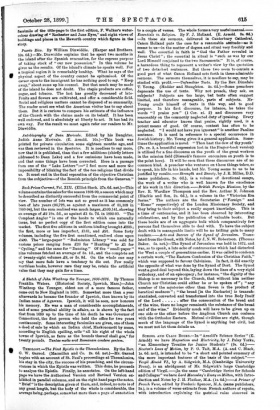▪ Tnaorkev. - The First Epistle to the Thessalonians. By the Rev.
w G. W. Garrod. (Macmillan and Co. 2s. 6d. net.)-Mr. Garrod begins with an account of St. Paul's proceedings at Thessalonica, his stay in the city, the success of his preaching, and the circum- stances in which the Epistle was written. This done, he proceeds to analyse the Epistle. Finally, he annotates. On the left-hand page we have the Authorised Version and Revised Version ex- hibited in parallel columns, and on the right-hand page the notes. "
Brief" lathe description given of them, and, indeed, no note is of any great length, but the body of the whole is considerable, the average being, perhaps, somewhat more than a page of annotation
to a couple of verses. The whole forms a very useful manual.- Essentials in Religion. By F. J. Holland. (E. Arnold. 3s. Eld.) -In these six sermons, delivered in Canterbury Cathedral, Canon Holland puts the case for a reasonable attitude-as it
seems to us-in the matter of dogma and ritual very forcibly and well. The essential in faith is "God the Father revealed in Jesus Christ" ; the essential in ritual is "such as was by our Lord Himself conjoined to the two Sacraments." It is, of course, a hazardous thing to represent a writer's view by the quotation of two detached sentences. But these two seem to contain a good part of what Canon Holland sets forth in these admirable sermons. The sermons themselves, it is needless to say, may be
studied with profit.- Unfamiliar Texts. By the Rev. Dinsdale
T. Young. (Hodder and Stoughton. 35. 6d.)-Some preachers deprecate the use of texts. Why not preach, they ask, on subjects? Subjects are too large, but texts often suggest limited, and therefore manageable, parts of subjects. Mr. Young avails himself of texts in this way, and to good purpose. In his first discourse, for intance, he takes the
words "I praise you" (1 Cor. xi. 2) and discourses very reasonably on the commonly neglected duty of ■praising. Every
teacher and educator knows that praise, rightly used, is a potent means of good. Of course, context has often to be neglected. "I would not have you ignorant" is another Pauline sentence. It is used in reference to a special occurrence in Jewish history ; Mr. Young gives it a general application. Some- times the application is novel. "Thou hest the dew of thy youth' (Ps. cx. 3, a beautiful expression lost in the Prayer-book version) is utilised for a fine discourse on the youth of the great workers in the mission field (Disraeli's famous encomium on youth is to the point here). It will be seen that these discourses are of no common kind. A preacher who ventures on these things takes, so to speak, his life in his hands, but Mr. Young seems to us to be
justified by results.- Strength and Beauty, by J. R. Miller, D.D.
(same publishers, 3s. 6d.), is a volume of devotional essays, the work of a writer who is well known for the excellence
of his work in this direction. -British Foreign Missions, by the
Rev. R. Wardlaw Thompson and the Rev. Arthur N. Johnson (Blackie and Son, 2s. 6d.), is a volume in the "Victorian Era Series." The authors are the Secretaries (" Foreign " and "Home" respectively) of the London Missionary Society, and they bring to their subject a really expert knowledge. This is a time of centenaries, and it has been observed by interesting celebrations, and by the publication of valuable books. But these books are of an aggregate bulk which comparatively few persons find themselves able to deal with. To have the subject dealt with in manageable limits will be no trifling gain to many
• readers.-Acts and Decrees of the Synod of Jerusalem. Trans-
lated from the Greek, with Notes, by J. N. W. Robertson. (Thomas Baker. 5s. net.)-The Synod of Jerusalem was held in 1672, and was, so to speak, a late echo of controversies which had disturbed the West a couple of generations earlier. It was called to condemn a certain work, "The Eastern Confession of the Christian Faith," which was supposed to favour Calvinism. In fact, it did exactly the opposite of what was done by the Synod of Dort. The Synod went a good deal beyond this, laying down the lines of a very rigid orthodoxy, and of an episcopacy ; for instance, "the dignity of the Bishop is so necessary in the Church, that without him neither Church nor Christian could either be or be spoken of " ; "any number of the mysteries other than Seven is the product of heretical madness " ; "the bread [in the Eucharist] is transub- stantiated, converted and transformed into the true Body Itself of the Lord after the consecration of the bread and of the wine, there no longer remaineth the substance of the bread and of the wine." Evidently much will have to be given up on one side or the other before the Anglican Church can coalesce with the Orthodox Eastern. Mutual civilities are right, though much of the language of the Synod is anything but civil, but we must not let them delude us.






































 Previous page
Previous page